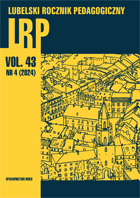INCLUSIVE EDUCATION (NOT) FOR ALL.
INSTITUTIONALIZATION OF SOCIAL AND EDUCATIONAL
PROBLEMS OF CHILDREN AND ADOLESCENTS
INCLUSIVE EDUCATION (NOT) FOR ALL.
INSTITUTIONALIZATION OF SOCIAL AND EDUCATIONAL
PROBLEMS OF CHILDREN AND ADOLESCENTS
Author(s): Andrzej ChudnickiSubject(s): School education, Inclusive Education / Inclusion, Pedagogy
Published by: Wydawnictwo Naukowe Uniwersytetu Marii Curie-Sklodowskiej
Keywords: juveniles; rehabilitation facilities; social therapy centres; medicalisation; inclusive education;
Summary/Abstract: Introduction: In recent years, inclusive education has become the main direction of educationpolicy. It was intended to guarantee pupils with special educational needs, including malad-justed students and pupils at risk of social maladjustment, the opportunity to function fully ina school community, reducing the use of segregation-based and special solutions.Research Aim: The aim of the study was to determine whether implementation of inclusive ed-ucation actually contributes to the integration of maladjusted students and those at risk of socialmaladjustment into mainstream education. Process tracking method was used in the analysis.Evidence-based Facts: Despite the demographic decline and a decrease in the total number ofpupils with special educational needs statement, there was an increase in the number of chil-dren and adolescents placed in social rehabilitation and social therapy centres.Summary: The hypothesis that these changes are the result of the implementation of inclusiveeducation was not supported. At the same time, the rival hypothesis assuming that the changesare the result of the progressive medicalisation of social problems and school failure, whichpromotes the use of special solutions, was not refuted.
Journal: Lubelski Rocznik Pedagogiczny
- Issue Year: 43/2024
- Issue No: 4
- Page Range: 91-108
- Page Count: 18
- Language: English

